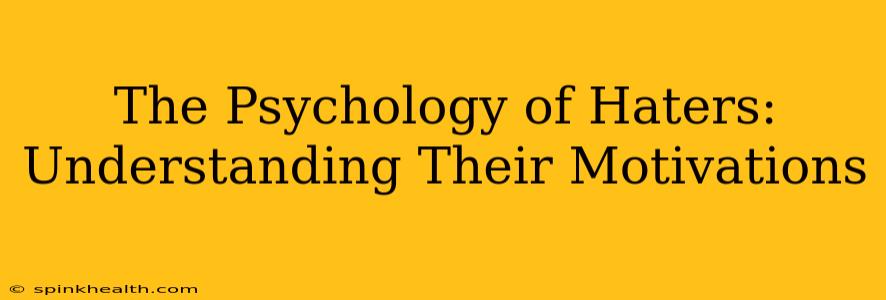We've all encountered them – the haters. Those individuals who seem driven by a relentless need to criticize, belittle, and spread negativity. But what fuels this behavior? Understanding the psychology of haters is crucial not only for navigating online interactions but also for fostering healthier relationships in our personal lives. This exploration delves into the complex motivations behind hateful behavior, offering insights into the underlying psychological factors at play.
Why Do People Hate? The Root Causes of Hatred
The simple answer is that there's no single reason. Hatred is a multifaceted emotion stemming from a complex interplay of psychological, social, and individual factors. It's rarely a spontaneous outburst but rather a manifestation of deeper-seated issues.
Frustration and Aggression:
One prominent theory suggests that hatred arises from frustration and aggression. When individuals feel thwarted in achieving their goals or experience perceived injustice, they may displace their anger and frustration onto others, expressing it through hateful actions or words. This is often seen in situations of social inequality or perceived unfairness.
Insecurity and Low Self-Esteem:
Ironically, hateful behavior can be a defense mechanism stemming from deep-seated insecurity and low self-esteem. By putting others down, haters attempt to elevate their own sense of self-worth, albeit in a destructive way. This is often subconscious, a manifestation of their own internal struggles.
Fear and Prejudice:
Hatred often thrives on fear and prejudice. Preconceived notions and stereotypes about particular groups or individuals can fuel negative attitudes and behaviors. This can range from subtle biases to overt expressions of racism, sexism, homophobia, and other forms of discrimination. Fear of the "other" often plays a significant role in fueling these prejudices.
Ideology and Group Identity:
Strong ideological beliefs and group affiliations can also contribute to hatred. Individuals may feel a sense of loyalty and belonging to a particular group, leading them to dehumanize and reject those outside their in-group. This "us versus them" mentality can be incredibly powerful and destructive.
What Drives Online Haters? The Digital Dimension
The internet, with its anonymity and vast reach, has amplified the impact of hateful behavior. Online haters often feel emboldened by the perceived lack of accountability and consequences.
Anonymity and Deindividuation:
Online platforms offer a veil of anonymity, reducing the sense of personal responsibility and increasing the likelihood of hateful comments. This phenomenon, known as deindividuation, allows individuals to act in ways they wouldn't in face-to-face interactions.
Echo Chambers and Polarization:
Social media algorithms often reinforce existing beliefs, creating echo chambers where individuals are primarily exposed to information that confirms their biases. This can lead to increased polarization and the radicalization of hateful views.
Cyberbullying and Online Harassment:
Online haters frequently engage in cyberbullying and online harassment, causing significant emotional distress and psychological harm to their victims. The persistent nature of online hate can have lasting consequences.
How to Handle Haters: Strategies for Dealing with Negativity
While we can't control the actions of others, we can control our reactions. Learning to manage interactions with haters is crucial for maintaining mental well-being.
Ignoring and Blocking:
Often, the most effective strategy is to simply ignore and block hateful individuals. This removes their ability to influence your emotions and well-being.
Setting Boundaries:
It's essential to establish clear boundaries in both online and offline interactions. Don't hesitate to disengage from conversations that become toxic or abusive.
Focusing on Self-Care:
Dealing with hate can be emotionally draining. Prioritizing self-care activities, such as exercise, mindfulness, and spending time with supportive people, is essential for maintaining mental well-being.
Seeking Support:
If you're experiencing persistent online harassment or abuse, don't hesitate to seek support from friends, family, or mental health professionals.
Conclusion: Understanding the Complexities of Hate
The psychology of haters is complex and multifaceted. It's crucial to recognize that hatred often stems from deeper issues, including insecurity, fear, and social inequalities. By understanding the underlying motivations, we can begin to develop more effective strategies for combating hate and fostering more positive and inclusive environments, both online and offline. Further research into the neurobiological and societal factors that contribute to hatred remains crucial in developing effective interventions and promoting empathy and understanding.

